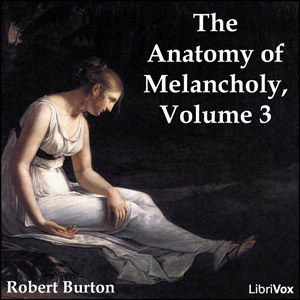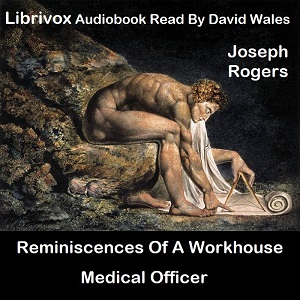
The Anatomy of Melancholy is a book by Robert Burton, first published in 1621. On its surface, the book is a medical textbook in which Burton applies his large and varied learning in the scholastic manner to the subject of melancholia (which includes what is now termed clinical depression).
Though presented as a medical text, The Anatomy of Melancholy is as much a sui generis work of literature as it is a scientific or philosophical text, and Burton addresses far more than his stated subject. In fact, the Anatomy uses melancholy as the lens through which all human emotion and thought may be scrutinized, and virtually the entire contents of a 17th-century library are marshalled into service of this goal.
Burton is forthright about his intentions in writing the Anatomy — "I write of melancholy by being busy to avoid melancholy," he concedes. This acknowledged desire to distract and amuse himself motivated Burton to produce a wide-ranging document, containing digressions and commentary. Whatever its strengths as a medical text or as a historical document, it is the Anatomy's vast breadth — addressing topics such as digestion, goblins, the geography of America, and others — and the particularly characteristic voice of its author that are most commonly cited by its admirers as the main sources of its appeal. Both satirical and serious in tone, the Anatomy is "vitalized by (Burton's) pervading humour", and Burton's digressive and inclusive style, often verging on a stream of consciousness, consistently informs and animates the text. (Summary from Wikipedia)
53 episodes

The Anatomy of Melancholy is a book by Robert Burton, first published in 1621. On its surface, the book is a medical textbook in which Burton applies his large and varied learning in the scholastic manner to the subject of melancholia (which includes what is now termed clinical depression).
Though presented as a medical text, The Anatomy of Melancholy is as much a sui generis work of literature as it is a scientific or philosophical text, and Burton addresses far more than his stated subject. In fact, the Anatomy uses melancholy as the lens through which all human emotion and thought may be scrutinized, and virtually the entire contents of a 17th-century library are marshalled into service of this goal.
Burton is forthright about his intentions in writing the Anatomy — "I write of melancholy by being busy to avoid melancholy," he concedes. This acknowledged desire to distract and amuse himself motivated Burton to produce a wide-ranging document, containing digressions and commentary. Whatever its strengths as a medical text or as a historical document, it is the Anatomy's vast breadth — addressing topics such as digestion, goblins, the geography of America, and others — and the particularly characteristic voice of its author that are most commonly cited by its admirers as the main sources of its appeal. Both satirical and serious in tone, the Anatomy is "vitalized by (Burton's) pervading humour", and Burton's digressive and inclusive style, often verging on a stream of consciousness, consistently informs and animates the text. (Summary from Wikipedia)
39 episodes

The Anatomy of Melancholy is a book by Robert Burton, first published in 1621. On its surface, the book is a medical textbook in which Burton applies his large and varied learning in the scholastic manner to the subject of melancholia (which includes what is now termed clinical depression).
Though presented as a medical text, The Anatomy of Melancholy is as much a sui generis work of literature as it is a scientific or philosophical text, and Burton addresses far more than his stated subject. In fact, the Anatomy uses melancholy as the lens through which all human emotion and thought may be scrutinized, and virtually the entire contents of a 17th-century library are marshalled into service of this goal.
Burton is forthright about his intentions in writing the Anatomy — "I write of melancholy by being busy to avoid melancholy," he concedes. This acknowledged desire to distract and amuse himself motivated Burton to produce a wide-ranging document, containing digressions and commentary. Whatever its strengths as a medical text or as a historical document, it is the Anatomy's vast breadth — addressing topics such as digestion, goblins, the geography of America, and others — and the particularly characteristic voice of its author that are most commonly cited by its admirers as the main sources of its appeal. Both satirical and serious in tone, the Anatomy is "vitalized by (Burton's) pervading humour", and Burton's digressive and inclusive style, often verging on a stream of consciousness, consistently informs and animates the text. (Summary from Wikipedia)
49 episodes
The journal of British naturalist Bruce Frederick Cummings, spanning from his early childhood through to his early death from complications stemming from multiple sclerosis. The diary combines beautiful, lyrical passages concerning the natural world with more introspective ruminations reminiscent of Kafka. Although successful and scandalous upon their publication in 1919, interest in the diaries has faded along with public interest in naturalism and diary writing more generally. However, Cummings' work is very modern is its forthright confessional tone and contains some deeply moving pieces of writing not easily forgotten. - Summary by Adam Whybray
20 episodes

Mahatma Gandhi, known today as a fascinating political leader and pacifist, also considered himself "something of an authority on matters of Health and Disease as well. Very few of us perhaps are aware that he is the author of quite an original little Health-book in Gujarati. [...] His views are of course radically different from the ordinary views that find expression in the pages of such books; in many cases, indeed, his doctrines must be pronounced revolutionary, and will doubtless be regarded by a certain class of readers as wholly impracticable. Even the most revolutionary of his doctrines, however, are based, not on the shifting quicksands of mere theory, but on the solid foundation of deep study, backed up by personal experience of nearly thirty years. He himself recognizes that many of his views will hardly be accepted by the ordinary reader, but he has felt himself impelled by a stern sense of duty to give publicity to his convictions formed after so much of study and experience" (Preface).
Though his advice may appear socially outdated or medically obvious/dubious to his modern day audience based on what we know now, Gandhi's treatise still provides a fascinating look on maintaining good health as it was understood in the early twentieth century. - Summary by Mary Kay and A. Rama Iyer
24 episodes
This book is addressed to the sorrowful, ... to whom their own or others' pain is a daily burden, upon whose hearts it weighs with an intolerable anguish. I seek to speak to these ; not as a teacher, but as a fellow. Sharing their feeling, and knowing well how vain is the attempt to throw off misery, or to persuade ourselves that life is better than it is, I would fain share with them also some thoughts that have seemed to me capable of casting a bright gleam of light athwart the darkness, and, if they are true, of bringing an immense, an incredible joy out of the very bosom of distress. - Summary by James Hinton
9 episodes
The Natural History of Chocolate being a Distinct and Particular Account of the Cocoa-tree, its Growth and Culture, and the Preparation, Excellent Properties, and Medicinal Virtues of its Fruit. Wherein the Errors of those who have wrote upon this Subject are discovered; the Best Way of Making Chocolate is explained; and several Uncommon Medicines drawn from it, are communicated. - Summary by D. de Quelus
12 episodes
This 1911 history of the public health revolution that transformed New York City in the nineteenth century is also about every city and town of the world and the sanitary challenges that each encountered. Stephen Smith (1823-1922) was an American surgeon and a pioneer in public health. “The story of a great life-saving social revolution, the mightiest in the nineteenth century and one of the most momentous in the history of civilization, is told here for the first time. It is told from the standpoint of the transformation of the City of New York, by a chief actor in the event.” Chapter four, New York The Unclean, is the heart of this work. ( Publisher's Note and David Wales)
11 episodes
Wrong thinking produces inharmony in our body, which in turn produces sickness. Our bodies sometimes are instantly re-harmonized while in the Silence. In the Silence our minds become passive, open, free and loving, at which time the Infinite Master of harmony touches the mental chords of our being and we are well. - Summary by David Van Bush
12 episodes
In this short, amusing book, subtitled "How to Be Thin and Reduce The Waist Line," Samuel G. Blythe explains how he was able to lose, and keep off, 50 pounds, without resorting to fad diets or giving up the foods he loved. Over a hundred years later, his common-sense advice about food, drink and exercise still makes sense today. ***NOTE: It should be noted that there is language within this book that was commonplace during the time this book was written that is often considered offensive today.*** (Christine Lehman)
3 episodes
"In this little book, the writer, looking back to his own days of inexperience in cycling, has endeavored to furnish some useful information and advice to those who intend joining the army of wheelmen, or who, in their first season on the road, are beginning to appreciate the healthy pleasure which cycling brings. The book [is] especially intended to aid the amateur rider of the safety bicycle in the intelligent use of his wheel. Further, the writer has attempted, perhaps too emphatically as some may think, to commend the merits of bicycling as a means towards innocent enjoyment and healthy living." Written in 1895, one year before Henry Ford invented his first "quadricycle", this book presents an idyllic picture of cycling before the era of cars. (Summary modified from the preface)
9 episodes
In 1827 Thomas Southwood-Smith published The Use of the Dead to the Living, a pamphlet which argued that the current system of burial in the United Kingdom was a wasteful use of bodies that could otherwise be used for dissection by the medical profession. "If, by any appropriation of the dead, I can promote the happiness of the living, then it is my duty to conquer the reluctance I may feel to such a disposition of the dead, however well-founded or strong that reluctance may be". Southwood-Smith's lobbying helped lead to the 1832 Anatomy Act, the legislation which allowed the state to seize unclaimed corpses from workhouses and sell them to surgical schools. While this act is credited with ending the practice of grave robbery, it has also been condemned as discriminatory against the poor. Thomas Southwood- Smith (1788 – 1861) was an English physician and sanitary reformer. - Summary by Wikipedia and David Wales
5 episodes
We have seen that as mankind rises in the scale of civilization the body becomes increasingly less important. Nevertheless, I wish it to be clearly understood, that I do not maintain that it is preferable to be ill than well, but only that each state has its own peculiar privileges, which are rarely interchangeable.
Health and sickness are merely different roads to achievement. The earth requires rain as well as sunshine; we need both tears and laughter; navvies are necessary and so are philosophers.
The book details how people from many professions who had some or other physical disability or pain reached their goals. The introduction is by Kate Douglas Wiggin.
- Summary by Stav Nisser and the conclusion of the book.
17 episodes
"People will worry, they do worry. What they want to know and need to learn is how to quit worrying. This I have attempted herein to show, with the full knowledge, however, that no one person's recipe can infallibly be used by any other person—so that, in reality, all I have tried to do is to set forth the means I have followed to teach myself the delightful lesson of serenity, of freedom from worry, and thereby to suggest to receptive minds a way by which they may possibly attain the same desirable end." - Summary by George Wharton James
26 episodes
Joseph Rogers (1821-1889) was an English physician, medical officer, and health care reformer in London. The system of poor-law dispensaries and separate sick wards, with proper staffs of medical attendants and nurses, was due to the efforts of Rogers and his colleagues. His memoir, published in 1889, contains an informative biography written by his brother. His career was not without conflict as his zeal sometimes offended governing boards. - Summary by David Wales
10 episodes














